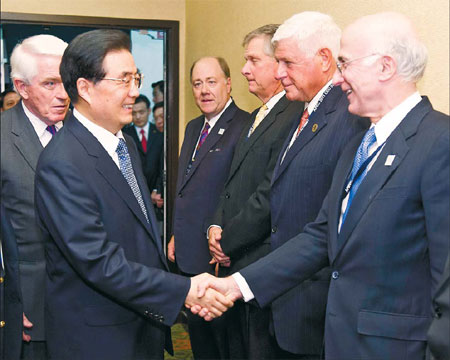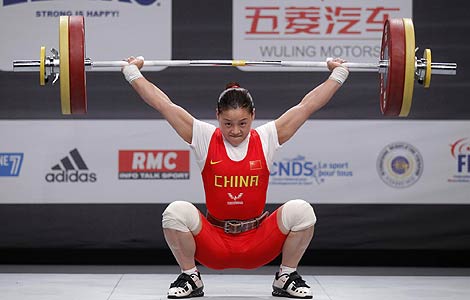China's boom a boon to US business
Updated: 2011-11-12 07:47
By Wu Jiao, Wei Tian and Tan Yingzi (China Daily)
|
|||||||||
|
 |
|
President Hu Jintao meets US business leaders in Honolulu, Hawaii, on Thursday. Huang Jingwen / Xinhua |
President Hu warns against protectionism to deal with economic woes
HONOLULU / BEIJING - China's booming consumption and investment demand in the coming five years will generate a huge market for US companies, President Hu Jintao said on Thursday.
"China's imports in the coming five years may total $8 trillion and our retail market could expand to $5 trillion by 2015," Hu said. "This will provide a huge market for the United States, which is aiming to revitalize its manufacturing industry and double its exports."
But he warned that politicizing trade frictions and resorting to protectionism should not be the way to address trade disputes between the world's two largest economies.
The two countries should consult equally and handle their trade disputes properly in line with World Trade Organization rules, Hu said.
He made the remarks during a meeting with US business leaders on Thursday, ahead of his meeting with US counterpart Barack Obama scheduled for Saturday, local time, in Honolulu.
The US could help resolve its trade deficit and unemployment problem by loosening restrictions on exporting its high-tech products, Hu told the US business leaders.
They also discussed the expansion of Chinese investment in the US to increase local jobs. Hu urged the US to take more concrete actions to help Chinese firms invest in the US.
US business leaders said that China-US trade ties may be the most important bilateral economic relationship of the century.
"We are committed to expanding it and growing it, in a manner that benefits both sides," said Thomas Donohue, president and CEO of the US Chamber of Commerce.
The two countries are each other's second-largest trade partners, with bilateral trade volume rising to $385 billion in 2010.
Hu also reaffirmed China's commitment to protecting intellectual property rights, saying China will enhance its law enforcement in that area.
Hu arrived in Honolulu with other Asia-Pacific leaders to attend the Asia-Pacific Economic Cooperation Leaders' Meeting.
Analysts called on China and the US to join hands to help keep alive the flickering hopes of a continued global economic recovery while the European Union is struggling to avoid sliding into the abyss of the debt crisis.
"The 2008 crisis has brought home that the fiscal and monetary measures of the US, China and Europe are interconnected, and coordination is very important and urgent to ensure global economic recovery," Gustaaf Geeraerts, director of Brussels Institute of Contemporary China Studies, said at a forum in Beijing.
But analysts have warned that protectionism, which is often more prevalent during times of crisis, could hurt China-US economic relations, which are ever more important as Europe is trapped in a debt crisis.
In the latest trade measures against China, the US is investigating Chinese solar photovoltaic companies for alleged government subsidies.
"China will face a tougher global trade climate in the years to come, because of the ups and downs in the US and Europe," Zhong Shan, vice-minister of commerce, said in a prepared text of his speech for the forum.
China has received the most anti-dumping investigations for 16 consecutive years, and also tops the most investigated countries for anti-subsidy cases, Zhong said. He urged countries with trade deficits with China to ease their restrictions on exports to balance bilateral trade, rather than just resort to blocking imports.
The world is suffering from more trade protectionist measures, said Gordon Orr, Asia chairman of McKinsey & Company.
The Ministry of Commerce also said in a trade report released on Friday that there could be more trade protectionist measures against China next year due to domestic elections and continued economic woes in developed countries.
China is making efforts to solve its economic problems, which helps promote global economic stability and rebalancing, analysts said.
Official figures show that China's new yuan lending was 586.8 billion yuan ($92.5 billion) in October, the highest since June, which analysts said is a result of monetary loosening to slightly boost liquidity to stabilize the world's second-largest economy.
Meanwhile, it has successfully driven down the ratio of trade surplus to GDP to slightly less than 3 percent this year from more than 10 percent in 2007.
Its imports surged in October as exports grew at their slowest rate in five months, suggesting efforts to tilt the economy toward domestic demand are paying off.











